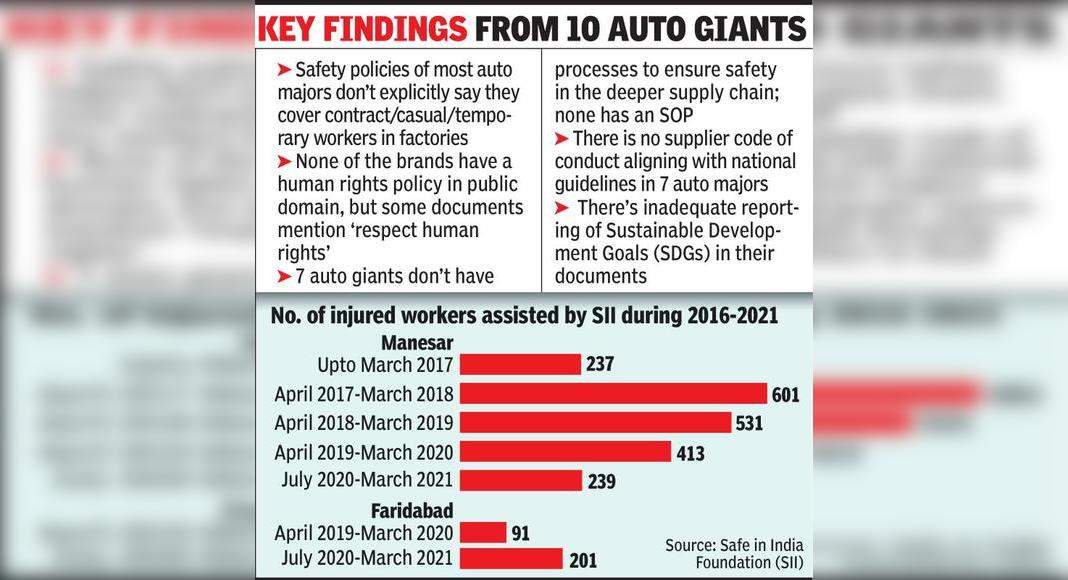Gurgaon: Calling for an introspection into safety protocols of various supply chain firms in the colossal automobile manufacturing ecosystem, a study by the Safe In India Foundation (SII) has underlined gaps in 10 automobile giants’ policy framework on ensuring safe working conditions for workers employed in their ancillary units.
The findings, says the report’s foreword, point to a “disrespect for the lives of workers and the conditions in which they work”.
Describing the automobile giants as “role models”, it says they must set very high standards and “demand respect” for human safety in their supply chains.
Th is SII’s third report after Crushed 2019 and Crushed 2020, which focused on accidents in automobile factories.
Called Safetyniti 2021, it turns its attention to the upstream and downstream ecosystems of the automobile giants, the deeper supply chain of tier 2, 3 and 4 companies.
According to the report, the SII team has assisted more than 2,600 injured workers from 2016-21 – 440 of these were in 2020-21, a year of curtailed manufacturing activity because of the pandemic – in the Gurgaon-Manesar and Faridabad automobile manufacturing sectors.
It says around 70% of them have lost fingers or even hands to factory accidents, leading to permanent disability.
“More than 90% of the auto-sector workers that SII has assisted report that they were injured in factories supplying to one or more of the three largest OEMs (original equipment manufacturers) in the region,” says the report.
The SII’s report is an outcome of its analysis of factory accidents and research of policies and practices of India’s largest OEMs, or auto giants.
Among its main observations on the policy framework is that safety policies of most auto majors don’t explicitly say they cover contract/casual/temporary workers in their own factories and that seven out of the 10 companies don’t have a supplier code of conduct to align with National Guidelines for Responsible Business Conduct (NGRBC).
According to the report, nearly 90% of the injured workers that SII assisted and analysed were migrants, from UP, Bihar and Odisha.
Of them, 65% were contractual workers and 95% were not affiliated with any union that could fight for their rights.
Further, the report finds that 59% of accidents happen on one type of machine – the power press.
SII argues the findings point to a larger problem — the lack of a transparent safety audit to provide decent working conditions.
“The general fatigue due to lack of decent and safe working conditions coupled with exposure to hazardous machines that are not covered under standard code of conduct or operating procedures result in these accidents,” said Sandeep Sachdeva, co-founder & CEO, SII.
“After exploring the extent of the issue, we wanted to find out the reasons behind such a large number of accidents and how they impact not only the lives of the workers but also businesses.
That’s when we started analysing the data of the top 10 auto brands and view their policies in terms of the safety net they provide,” Sachdeva added.
The SII report makes a case for industries and regulatory bodies to come together to fix policy gaps for contractual workers and deeper supply chain workers.
It argues that the first step is to acknowledge the problem and get basics like issuing employment letter to contractual workers, mandatory health checkups for those above 45, training on safely operating machines and regular monitoring of machines in place and allow safety audits.
It also calls for all establishments with over 10 workers to be registered with Employees’ State Insurance Corporation (ESIC).
The report mentions three auto giants have already initiated steps to address the issues highlighted by SII.
The Society of Indian Automobile Manufacturers (SIAM) acknowledged the problem and said the industry should come together to ensure safe working conditions for workers by borrowing from the best practices of automobile giants like Maruti, Tata and Bajaj.
“Worker safety is good for business, good for productivity.
There have been some good practices, but a lot more should happen.
These are some areas that we found important to focus on in our engagement with member OEMs: how to share best practices on safety; how to engage with all levels of the supply chain, and focus on the issue of supplier code of conduct,” said Rajesh Menon, director general of SIAM.
Vinnie Mehta, director general, Automotive Component Manufacturers Association of India (ACMA), added, “The pandemic has brought to the forefront the importance of human resources to an organisation – you need to take care of employees because they are important to business continuity and productivity.
Safety parameters taken into account are the number of accidents, unsafe conditions, unsafe activities, records of near-misses, safety index number based on risk evaluation of the company, a check on employee health expenses of the company, regular kaizen for safety and safety non-compliance identified and rectified.”


